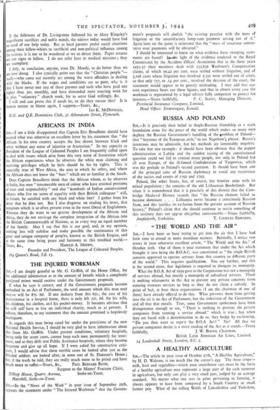RUSSIA AND POLAND
Snt,—It is precisely their belief in Anglo-Russian friendship as a main foundation stone for the peace of the world which makes so many men deplore the Russian Government's handling of the iproblem of Poland— that " keystone of the European arch," to use Napoleon'i phrase. Russia's intentions may be admirable, but her methods are lamentably impolitic. To take but one example: it should have been obvious that the puppet administration at Lublin and the sudden raising of the constitutional question could net fail to remind many people, not only in Poland but all over Europe, of the ill-famed Confederation of Targowica, which was the prelude to Poland's second partition. It should have been one of the principal aims of Russian diplomacy to avoid any recurrence of the tactics and events of 1792 and 1793.
Poland, like other States, has, of course, her frontier zone with its 'mixed population ; the remains of the old Lithuanian Borderlands. But when it is remembered that it is precisely of this district that the Cam- bridge Medieval History records that " the Russian element failed to become dominant . . . Lithuania never became a consciously Russian State, and this justifies its exclusion from' the present account of Russian history," Poland's claim that she should continue to retain something of this territory does not appear altogether unreasonahle.—Yours faithfully,


























 Previous page
Previous page